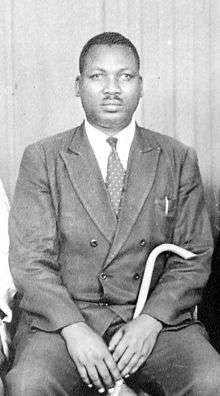Mathias E. Mnyampala

Mathias E. Mnyampala (1917–1969) was a Tanzanian writer, lawyer, and poet. Mnyampala was born on 18 November according to a personal record form of 1956,[1] but he wrote in his autobiography that he only knew the year with accuracy.[2] He was born in the hamlet of Muntundya depending of the village of Ihumwa in Chamwino District in Dodoma region at the time part of German East Africa. He died on 8 June 1969 in Dodoma city, Tanzania. Mnyampala wrote in Swahili, the lingua franca of East Africa, not Cigogo, the native language of his ethnic group.
Mnyampala wrote more than 25 books.[3] Among them was Historia, mila, na desturi za Wagogo, a history of the Gogo people commissioned by the British colonial government.[4] This book was translated into English by Gregory H. Maddox and published in 1995 as The Gogo: History, Customs, and Traditions.
Mathias E. Mnyampala was working as a Tax Clerk for the Native Treasury in Dodoma during the colonial rule. He was intended to travel the whole Ugogo region in order to collect the tax and establish a census of the populations and their belongings. This is why he entered into contact with the Watemi, the gogo traditional Kings and Rainmakers, who allowed him to write this historical book by giving him the oral sources of his ten years long work. The author was pioneering in Kiswahili in the early 1940s the ethno-history trend and in the same time was a faithful messenger for special correspondences between the then Freedom Fighters Movement called Tanganyika African National Union (TANU) and the Watemi.
After the Independence of Tanganyika in 1961, Mathias E. Mnyampala continued his administrative career in the Judicial system as a Magistrate. His former pro-TANU sympathies and his literary talent allowed him to become the national chairman of the association of Kiswahili poets called Usanifu wa Kiswahili na Ushairi Tanzania (UKUTA). This association was in charge to promote the diffusion of Kiswahili, the official language of the new Tanzanian Nation, by teaching to the Tanzanian masses the classical forms of Kiswahili poetry and their conservative transformations.
Selected bibliography
- Historia, mila, na desturi za Wagogo wa Tanganyika. Eagle Press. 1954.
- Utenzi wa Enjili Takatifu. Ndanda Mission Press. 1962.
- Diwani ya Mnyampala (Vol. 5). East African Literature Bureau. 1963.
- Ngonjera za ukuta. Oxford University Press. 1970.
- The Gogo: History, Customs, and Traditions. Sharpe. 1995.
- Historia ya Hayati Sheikh Kaluta Amri Abedi (1924-1964). Ahmadiyya Mission Press. 2011. ISBN 9789976891645.
- Maisha ni kugharimia. DL2A - Buluu Publishing. 2013. ISBN 9791092789027.
- Mnyampala, M. E. (2014). Ugogo na ardhi yake. DL2A - Buluu Publishing. France. ISBN 9791092789201. 112 p.
References
- ↑ Roy, Mathieu (2013). Mathias E. Mnyampala (1917-1969) : POÉSIE D'EXPRESSION SWAHILIE ET CONSTRUCTION NATIONALE TANZANIENNE [Kiswahili poetry and the Tanzanian nation building]. France: Institut National des Langues et Civilisations. p. 1008. Retrieved 14 September 2013.
- ↑ Mnyampala, Mathias (2013). Maisha ni kugharimia. Tanzania: DL2A - BULUU PUBLISHING. p. 4. ISBN 9791092789027.
- ↑ Mulokozi, Mlinzi (1995). History of Kiswahili Poetry. Tanzania: Institute of Kiswahili Research UDSM. p. 47.
- ↑ Africa: Journal of the International African Institute. Cambridge University Press. 67 (2): 326. 1997. doi:10.2307/1161450. Missing or empty
|title=(help)
External links
- Mathias E. Mnyampala at Encyclopædia Britannica
- Portrait of Mathias E. Mnyampala (c.1960)
- Grave of Mathias E. Mnyampala (Dodoma - Tanzania, 2008)